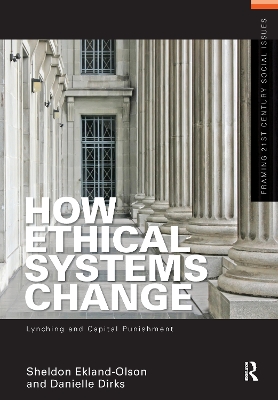Framing 21st Century Social Issues
3 total works
How Ethical Systems Change: Eugenics, the Final Solution, Bioethics
by Sheldon Ekland-Olson and Julie Beicken
Mandatory sterilization laws enacted in dozens of states coast-to-coast and approved by the U.S. Supreme Court formed the initial pillar for what became the Final Solution. Following WWII, there was renewed interest in a more inclusive view of social worth and the autonomy of the individual. Social movements were launched to secure broad-based revisions in civil and human rights. This book is based on a hugely popular undergraduate course taught at the University of Texas, and is ideal for those interested in science-based policy, the social construction of social worth, social problems, and social movements.
This book is an excerpt from a larger text, Who Lives, Who Dies, Who Decides?, http://www.routledge.com/9780415892476/
How Ethical Systems Change: Lynching and Capital Punishment
by Sheldon Ekland-Olson and Danielle Dirks
Slavery, lynching and capital punishment were interwoven in the United States and by the mid-twentieth century these connections gave rise to a small but well-focused reform movement. Biased and perfunctory procedures were replaced by prolonged trials and appeals, which some found messy and meaningless; DNA profiling clearly established innocent persons had been sentenced to death. The debate over taking life to protect life continues; this book is based on a hugely popular undergraduate course taught at the University of Texas, and is ideal for those interested in criminal justice, social problems, social inequality, and social movements.
This book is an excerpt from a larger text, Who Lives, Who Dies, Who Decides?, http://www.routledge.com/9780415892476/
Confronting Campus Rape: Legal Landscapes, New Media, and Networked Activism offers a historical, legal, and social justice approach to the national crisis of sexual violence on college campuses. The author adeptly combines her personal experience with research to explore campus sexual assault and the experiences of survivors; to explain the wave of activism that has unfolded in the past few years and its meaning for students and advocacy; and to provide a guidebook on legal rights. This book is ideal for courses on social problems, race/class/gender, social movements, social justice, sociology of law, and American studies.


